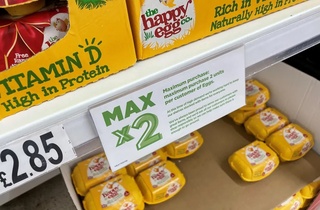Customers are being restricted to two boxes of eggs in Asda, and three in Lidl, to ensure availability.
“We are working hard with our suppliers to resolve the industry challenges which are currently affecting all supermarkets and to make sure as many customers as possible can buy eggs, we have introduced a temporary limit of two boxes per customer,” an Asda spokesperson said.
“Constrained supply and higher demand mean availability is lower than normal in some stores for some retailers. Unfortunately, AI (avian influenza) has added to these problems, in some cases directly because of flocks lost as part of the government’s disease control strategy, but also indirectly as the risk of AI has fueled a lack of confidence in investment in free-range production and tightened the supply base further,” The National Farmers' Union said in a statement.
Avian influenza, commonly known as bird flu, refers to a variety of influenza type A viruses found in wild and domesticated birds.
Since 2021, the United Kingdom has experienced its worst bird flu outbreak.
“The severity of the situation and scale of the impact is unprecedented and very, very scary. It’s a huge crisis that could turn into a catastrophe unless we get ahead of it,” the director of policy at the Royal Society for the Protection of Birds, Jeff Knott, said.
The Department for Environment, Food and Rural Affairs (DEFRA) and the Animal and Plant Health Agency publish regular reports on bird flu outbreaks. In the latest report, published on 24 October 2022, the risk rate for wild birds was set at ‘very high’, the risk for poultry with suboptimal biosecurity at ‘high’ and with stringent biosecurity at ‘medium’. The report stated: “As we head towards the winter months wild bird migrations will become more significant once again, with ongoing events across Europe and North America of concern in regard to implications to the UK.” (ILKHA)



 Spor
Spor
 Spor
Spor
 Dünya
Dünya
 Güncel
Güncel
 Güncel
Güncel
 Dünya
Dünya
 Dünya
Dünya
 Dünya
Dünya
 Dünya
Dünya
 Spor
Spor





